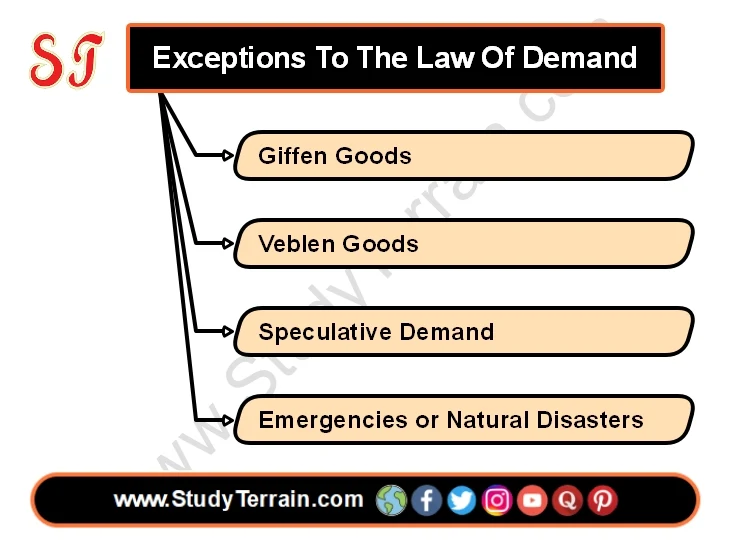The law of demand, a fundamental principle in economics, states that as the price of a good or service increases, the quantity demanded decreases, and vice versa. However, like many economic principles, the law of demand is not without exceptions. In this article, we'll explore some of the exceptions to the law of demand and understand the circumstances under which demand behaves differently.
Table of content(toc)
Exceptions To The Law Of Demand
 |
| Exceptions To The Law Of Demand |
Giffen Goods
Giffen goods are rare exceptions to the law of demand named after the Scottish economist Sir Robert Giffen. These goods are considered to be inferior goods for which the quantity demanded actually increases as the price rises. This phenomenon occurs when the good represents a significant portion of the consumer's budget, and an increase in price makes the consumer feel poorer.
A classic example of a Giffen good is staple food, such as rice, in impoverished communities. When the price of rice rises, low-income consumers may be forced to allocate more of their budget to rice, leaving less money for other food items. In such cases, they may buy more rice despite the higher price, leading to an upward-sloping demand curve.
Veblen Goods
Veblen goods are luxury goods for which demand increases as the price increases, contrary to the law of demand. This phenomenon occurs because the higher price of the good is seen as a status symbol or indicator of quality, leading to increased demand from affluent consumers.
Luxury cars, designer clothing, and high-end jewelry are examples of Veblen goods. When the price of these goods increases, demand may also increase as consumers perceive them to be more desirable due to their exclusivity and prestige.
Speculative Demand
In certain cases, consumers may anticipate future price increases and buy more of a good at the current lower price, leading to an increase in demand despite the price increase. This phenomenon is known as speculative demand and often occurs in markets where consumers expect prices to rise rapidly in the future.
For example, if consumers expect the price of a particular cryptocurrency or a rare collectible item to increase significantly in the future, they may buy more of it now, even at a higher price, in anticipation of selling it later at a profit.
Emergencies or Natural Disasters
During emergencies or natural disasters, demand for certain goods may increase despite price increases. This is because consumers prioritize acquiring essential goods, such as food, water, and medical supplies, to meet their immediate needs, regardless of the price.
For instance, in the aftermath of a hurricane, demand for bottled water and canned food may surge, leading to an increase in prices. Despite the higher prices, consumers may still buy more of these goods to ensure their survival, temporarily disregarding the usual downward-sloping demand curve.
Conclusion
While the law of demand holds true in most cases, there are exceptions that economists and businesses must be aware of. Understanding these exceptions is crucial for making accurate predictions about consumer behavior and market dynamics. By recognizing situations where demand behaves differently, businesses can adapt their strategies accordingly and navigate the complexities of the marketplace more effectively.
For more content visit KMBN 102



